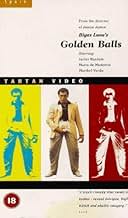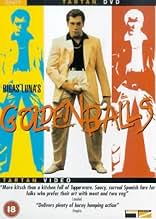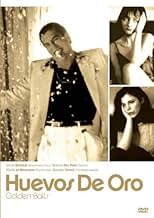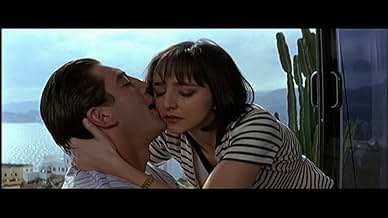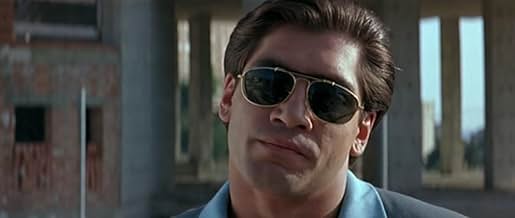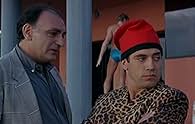AVALIAÇÃO DA IMDb
6,1/10
4,1 mil
SUA AVALIAÇÃO
Um trabalhador da construção civil usa seu charme e ousadia na tentativa de obter recursos financeiros suficientes para construir o projeto de seus sonhos.Um trabalhador da construção civil usa seu charme e ousadia na tentativa de obter recursos financeiros suficientes para construir o projeto de seus sonhos.Um trabalhador da construção civil usa seu charme e ousadia na tentativa de obter recursos financeiros suficientes para construir o projeto de seus sonhos.
- Direção
- Roteiristas
- Artistas
- Prêmios
- 4 vitórias e 3 indicações no total
Alessandro Gassmann
- El amigo de Melilla
- (as Alessandro Gassman)
Benicio Del Toro
- El amigo de Miami
- (as Benisio Del Toro)
Francesco Maria Dominedò
- El Mosca
- (as Francesco Mª Dominedo)
Francisco Casares
- El productor
- (as Paco Casares)
- Direção
- Roteiristas
- Elenco e equipe completos
- Produção, bilheteria e muito mais no IMDbPro
Avaliações em destaque
So, announces the DVD. But, this was a disappointing film. Not particularly bad but definitely not that good. Rather more crude and MTV video-like than the more subtle and masterful Jamon Jamon.
None of the characters are likable, the lovely Penelope Cruz of Bigas Luna's first film replaced by vacuous supermodels (in comparison, maybe they are great actresses) and it all reads like a tawdry and cheap paperback that you'd pick up at motorway service station.
Which, maybe is how Luna wanted it. Maybe he really is that repelled by the capitalist, nouveau-riche alpha male who believes his 'balls' not only rule his life but everybody else's, too. I know I am, and most people would be, too. Asked why Javier Bardem's lead character is sporting two gold Rolex's, he announces back "I have two balls, so I have two Rolex's".
Artistically there is little merit to this film, but it is about overblown, over-macho stereotypes and how they think they can walk over everybody. There are nods to Dali (the nude with ants over her pubic region is an extreme example) and there are more phallic insinuations in Goldenballs than any other film I know of. From Gonzalez (Bardem) Towers, intended to be the tallest tower on the Med, in which Luna loosely stretches a fabric of some kind of story around, with his dodgy dealings and cost-cutting.
Like, possibly his Tower, Gonzalez, and his potent sexual erections, does come a cropper, which is of some redemption, admittedly, but not enough to save the film. There's an early role for Benecio del Torro as the Miami-set gardener who happens to do more than service the sprinkler....
What finally made me only award two stars was the poor DVD quality. It's of video standard, plain and simple.
I bought Goldenballs as I wanted the three films in Luna's 'Iberian passion' trilogy, of which it is the middle. I'm seriously hoping that the final part, 'The Tit and the Moon' is an improvement.
None of the characters are likable, the lovely Penelope Cruz of Bigas Luna's first film replaced by vacuous supermodels (in comparison, maybe they are great actresses) and it all reads like a tawdry and cheap paperback that you'd pick up at motorway service station.
Which, maybe is how Luna wanted it. Maybe he really is that repelled by the capitalist, nouveau-riche alpha male who believes his 'balls' not only rule his life but everybody else's, too. I know I am, and most people would be, too. Asked why Javier Bardem's lead character is sporting two gold Rolex's, he announces back "I have two balls, so I have two Rolex's".
Artistically there is little merit to this film, but it is about overblown, over-macho stereotypes and how they think they can walk over everybody. There are nods to Dali (the nude with ants over her pubic region is an extreme example) and there are more phallic insinuations in Goldenballs than any other film I know of. From Gonzalez (Bardem) Towers, intended to be the tallest tower on the Med, in which Luna loosely stretches a fabric of some kind of story around, with his dodgy dealings and cost-cutting.
Like, possibly his Tower, Gonzalez, and his potent sexual erections, does come a cropper, which is of some redemption, admittedly, but not enough to save the film. There's an early role for Benecio del Torro as the Miami-set gardener who happens to do more than service the sprinkler....
What finally made me only award two stars was the poor DVD quality. It's of video standard, plain and simple.
I bought Goldenballs as I wanted the three films in Luna's 'Iberian passion' trilogy, of which it is the middle. I'm seriously hoping that the final part, 'The Tit and the Moon' is an improvement.
With some films it is really hard to tell for whom they were made. Huevos de oro seems to aim at the well educated Spanish middle class. There must be many inside jokes in this movie which you will not understand if you are an outsider. This can be pretty annoying.
Symbols and references to art and popular culture abound, the movie alludes to the work of Salvador Dalí, Luis Buñuel and the Surrealists in general, a certain infatuation with bidet baths seems to point to Duchamp's ready mades. What's more, the main character has also a knack for karaoke tapes with songs of Julio Iglesias. But why all this is mixed together in a rather pretty but also gratuitous way simply eludes me. I can only guess that it all serves to highlight the vital, impetuous, boorish vulgarity of the main character who the director seems to admire and despise at the same time. How all the really pretty women run after him (the main character, I mean) is slightly disconcerting.
The movie has three parts. It starts in the Spanish enclave of Melilla in Africa, where Benito, the main character, does his military service, apparently in the corps of engineers. Then it moves on to the resort town of Benidorm in Spanin where Benito just wants to build the highest skyscraper of the place and become a vulgarized Howard Roark. For the last part a defeated Benito moves to Miami, Florida, presumably in order to start a new life". But the change of places is not really explained satisfactorily. It is also somehow irritating that there is no character development and that the movie descends into a soap opera modus without being convincingly ironic. It must be said that Javier Bardem acquits himself very well playing the young stud who grows limp and deflated.
I purchased this movie because I am interested in townscapes. And Benidorm is a kind of a special place, townscapewise. In this aspect Huevos de oro satisfied me only partially. In Jess Franco's She Killed In Ecstasy (1970) this specific location was used in a more rewarding way.
Symbols and references to art and popular culture abound, the movie alludes to the work of Salvador Dalí, Luis Buñuel and the Surrealists in general, a certain infatuation with bidet baths seems to point to Duchamp's ready mades. What's more, the main character has also a knack for karaoke tapes with songs of Julio Iglesias. But why all this is mixed together in a rather pretty but also gratuitous way simply eludes me. I can only guess that it all serves to highlight the vital, impetuous, boorish vulgarity of the main character who the director seems to admire and despise at the same time. How all the really pretty women run after him (the main character, I mean) is slightly disconcerting.
The movie has three parts. It starts in the Spanish enclave of Melilla in Africa, where Benito, the main character, does his military service, apparently in the corps of engineers. Then it moves on to the resort town of Benidorm in Spanin where Benito just wants to build the highest skyscraper of the place and become a vulgarized Howard Roark. For the last part a defeated Benito moves to Miami, Florida, presumably in order to start a new life". But the change of places is not really explained satisfactorily. It is also somehow irritating that there is no character development and that the movie descends into a soap opera modus without being convincingly ironic. It must be said that Javier Bardem acquits himself very well playing the young stud who grows limp and deflated.
I purchased this movie because I am interested in townscapes. And Benidorm is a kind of a special place, townscapewise. In this aspect Huevos de oro satisfied me only partially. In Jess Franco's She Killed In Ecstasy (1970) this specific location was used in a more rewarding way.
Either you like Bigas Luna, or you don't. Huevos de Oro is the middle picture in his trilogy of weird romance films, the other two being the more noted Jamon Jamon and the truly bizarre La Teta y La Luna. All films have breast-obsessed Spanish macho men, sexy young women, love starved 40-ish women, love triangles wrapped around the oddest plots, and the most eyebrow raising sex conversations. All of these films seem to parody the Javier Bardem Spanish macho man character and how he is ultimately ruled by his libido. (The same can be said for most males).
Luna as a director introduced to me to three spectacular, stunning actresses in his films, namely Maria de Mederios, the now famous Penelope Cruz and Mathilda May. He also uses recent Oscar nominee Javier Bardem with great frequency.
In this film, there is a loose plot of a man (Bardem) who wishes to obtain financing for his construction business, and marries a woman he does not love (the wide-eyed Maria de Medieros) in the process. He maintains his passionate relationship with his first and true love, and ultimately gets entangled in his own romantic web. He never gives up his juggling act, until the three main characters come face to face.
What Luna does as a director is take these simple plots and wrap wonderfully strange characters with bizarre obsessions and mannerisms.
This movie has lots of passion, sex, conversation, and twisted romance, all bundled into an enjoyable and unique film. Many will be offended by Luna's unabashed approach to film-making, but this is still a fresh and unique picture. I recommend the three in this series highly. I can not guarantee you will like them, but I can guarantee that you will remember them. ***1/2
out of ****.
Luna as a director introduced to me to three spectacular, stunning actresses in his films, namely Maria de Mederios, the now famous Penelope Cruz and Mathilda May. He also uses recent Oscar nominee Javier Bardem with great frequency.
In this film, there is a loose plot of a man (Bardem) who wishes to obtain financing for his construction business, and marries a woman he does not love (the wide-eyed Maria de Medieros) in the process. He maintains his passionate relationship with his first and true love, and ultimately gets entangled in his own romantic web. He never gives up his juggling act, until the three main characters come face to face.
What Luna does as a director is take these simple plots and wrap wonderfully strange characters with bizarre obsessions and mannerisms.
This movie has lots of passion, sex, conversation, and twisted romance, all bundled into an enjoyable and unique film. Many will be offended by Luna's unabashed approach to film-making, but this is still a fresh and unique picture. I recommend the three in this series highly. I can not guarantee you will like them, but I can guarantee that you will remember them. ***1/2
out of ****.
Bigas Luna's 1993 film HUEVOS DE ORO ("Golden Balls/Eggs", a title punning on both the goose that laid the golden eggs and a tough guy's balls of steel) depicts the rise and fall of Benito Gonzalez (Javier Bardem), a young Spanish construction worker who becomes an affluent real estate developer on the Mediterranean coast.
After being jilted by his first girlfriend (Elisa Tovati), who leaves him for his best friend, Benito develops a mania for building the tallest building in Benidorm, which may be seen as little more than an enormous phallic symbol flaunting his manhood. Obsessed with this big construction project, his lust for his next woman, Claudia (Maribel Verdú) takes second place to having her sleep with potential investors to win them over. Benito then marries a banker's daughter, Marta (Maria de Medeiros) to have access to her father's funds. Benito lives a life of sexual excess and enormous consumption of food, especially the Alicante sweet known as torron. Like some of the work of Almodovar, Bigas Luna clearly likes riffing on Spanish stereotypes and regional differences.
Ultimately, however, Benito's hubris leads to his downfall. This protagonist is certainly an odious guy, but -- though I won't spoil the ending -- the depths to which he is ultimately sunk inspire a perverse sympathy in the viewer. Years went by between my first viewing of this film and the second, but in the interim I would often look back on this film's plot and ending scenes, thinking of how sad it was to lose everything and end up that way.
HUEVOS DE ORO isn't an especially deep film, but that dramatic arc, hewing very close to classical notions of tragedy, is impressive and I'd say this film is worth a watch.
After being jilted by his first girlfriend (Elisa Tovati), who leaves him for his best friend, Benito develops a mania for building the tallest building in Benidorm, which may be seen as little more than an enormous phallic symbol flaunting his manhood. Obsessed with this big construction project, his lust for his next woman, Claudia (Maribel Verdú) takes second place to having her sleep with potential investors to win them over. Benito then marries a banker's daughter, Marta (Maria de Medeiros) to have access to her father's funds. Benito lives a life of sexual excess and enormous consumption of food, especially the Alicante sweet known as torron. Like some of the work of Almodovar, Bigas Luna clearly likes riffing on Spanish stereotypes and regional differences.
Ultimately, however, Benito's hubris leads to his downfall. This protagonist is certainly an odious guy, but -- though I won't spoil the ending -- the depths to which he is ultimately sunk inspire a perverse sympathy in the viewer. Years went by between my first viewing of this film and the second, but in the interim I would often look back on this film's plot and ending scenes, thinking of how sad it was to lose everything and end up that way.
HUEVOS DE ORO isn't an especially deep film, but that dramatic arc, hewing very close to classical notions of tragedy, is impressive and I'd say this film is worth a watch.
This film is Spanish. This statement is not as obvious as you might think. Bigas Luna makes films so rich in Spanish cultural references that it is true that without previous knowledge, or better yet experience, of Spain then much of the film's charm will be lost. He parodies the stereotypes of spanish culture- the macho male most obviously, but there are numerous others- in such a way that anyone who accuses the characters of being over the top and unbelievable would very nearly be fully justified, if it wasn't that they are so instantly recognizable. Javier Bardem's character has wonderfully kitsch taste, most notably his attire and the obsession he has with Salvador Dali (to the point of outlining the famous 'drawers' across the bodies of all the women in his life). This goes a long way to creating the visual style which is somehow spot on for the mediterranean coast. The story itself is quite touching in the end, as a man of great passion and ambition rises from having nothing to having all he desires before the inexorable decent commences. There is much symbolism in this film for those who enjoy it. For example Bardem aims to erect the tallest building in town, yet as it fails and crumbles, so does his sexual potency. This film is admittedly an aquired taste, not for people who thrive on the tried and tested Hollywood formulae, unless they are willing to explore into the exotic and foreign world of Bigas Luna.
Você sabia?
- CuriosidadesSecond part of Bigas Luna's "Iberian Trilogy" also including Jamón, Jamón (1992) and A Teta e a Lua (1994).
- ConexõesReferenced in Uma Paixão Para Duas (1997)
- Trilhas sonorasHuevos de oro
(Theme)
By Nicola Piovani
Performed by the Orchestra dell'Unione Musicisti di Roma
Directed by Nicola Piovani
Violoncello soloist: Francesca Taviani
Principais escolhas
Faça login para avaliar e ver a lista de recomendações personalizadas
- How long is Golden Balls?Fornecido pela Alexa
Detalhes
- Data de lançamento
- Países de origem
- Central de atendimento oficial
- Idioma
- Também conhecido como
- Golden Balls
- Locações de filme
- Villajoyosa, Alicante, Comunidad Valenciana, Espanha(Playa Casco Antiguo)
- Empresas de produção
- Consulte mais créditos da empresa na IMDbPro
Bilheteria
- Orçamento
- ESP 420.000.000 (estimativa)
- Tempo de duração1 hora 35 minutos
- Mixagem de som
- Proporção
- 2.39 : 1
Contribua para esta página
Sugerir uma alteração ou adicionar conteúdo ausente



